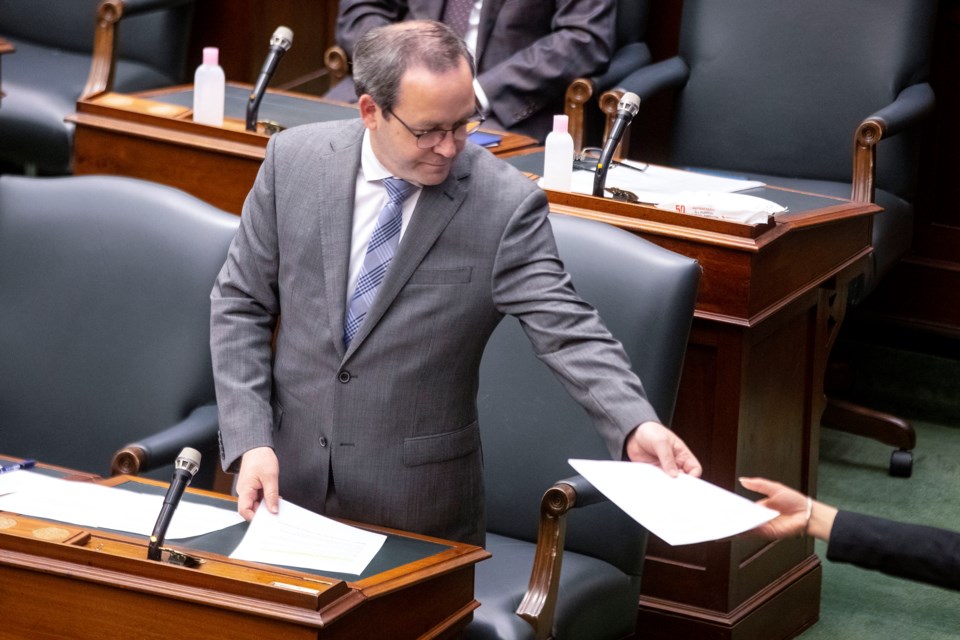Editor's note: The following article originally appeared on The Trillium, a new Village Media website devoted exclusively to covering provincial politics at Queen’s Park.
Attorney General Doug Downey wasn't keen to talk about his controversial justice system reforms on Tuesday during a rare media appearance.
Downey held an event in Toronto to unveil the new $956-million courthouse that amalgamates all Ontario Court of Justice criminal matters from six smaller courthouses across the city.
Ontario's Attorney General, who is also the MPP for Barrie-Springwater-Oro-Medonte, has made some waves in Ontario's legal community over the past few years, with changes to how judges are appointed and another change to how Ontario's next chief justice is chosen.
Current Ontario Court Chief Justice Lise Maisonneuve is set to retire in May. Downey wants more control over who replaces her, and that's spooked some legal experts who argue it violates the principle of judicial independence.
In December, the Toronto Star reported the next crop of candidates will apply directly to Downey. He'll then interview them and quietly consult with people on their suitability. Previously, the outgoing chief had a role in recommending and vetting candidates.
Downey was asked for an update and more information on the process.
"We're still on the same track," he said Tuesday. "Applications are in. We have candidates. I'm receiving discreet inquiries from other members. Then there will be interviews and a selection."
The process hasn't changed in light of criticism, he added.
"I've executed exactly the way I said I would," he said.
Maisonneuve, who was at the unveiling, declined to comment on the matter on Tuesday.
In a 2019 interview with TVO on the initial reforms to how justices — not just the chief justice — are picked, Downey said he wanted to ensure they share his "values."
"There are two parts to the appointment of judges. One is to decide whether they're qualified or not qualified," he said. "The second part is for me to pick people who reflect some of the values that I have."
"Understanding victims' issues, making sure that they have community leadership ... sometimes only I can asses that," he continued.
His comments took on new meaning after the move to take greater control of the chief justice replacement process, and other moves the government has taken around Ontario's tribunals, boards, and agencies that also administer aspects of the justice system.
The Ford government has come under intense fire for appointing unqualified people to Ontario's backlogged tribunals, some of whom have close ties to the Progressive Conservative Party or have donated to the party or individual PC politicians.
The Trillium asked Downey to elaborate on what he meant when he said "values," and to address whether it's part of an effort to make Ontario's judicial system more conservative.
"What I'm talking about here today is the courthouse, so I'm going to focus primarily on that," he said. "In terms of the picking of the next chief justice, it's important that we have an open, transparent process, which we do. We have several candidates, which is a new phenomenon. So I'm proud of the track that we're on."
The Trillium pressed him, but he refused to answer, saying he's focused on the new courthouse.
For criminal defence lawyer Michael Spratt, who's no fan of Downey's past moves, the non-answers don't cut it.
"It's disappointing that Ontario's attorney general fails to recognize the damage that he could do not only to the administration of justice but more importantly to the public's confidence in the administration of justice," he told The Trillium on Tuesday.
"When you look at his desire to appoint judges who think more like him, he's been unable to expand or unwilling to elaborate on what he means by that," Spratt said.
Getting politicians more involved in the judicial selection process risks politicizing the courts, which is a "dangerous path to tread," he said.
"We can look south of the border to see the damaging impact. We see the damage in the United States, where appointments are delayed, where there is certainty of how judges will decide an issue before they've even heard any arguments," he said.
Spratt didn't see any real problems with Ontario's past appointment processes and questioned the motive for change.
Both NDP Leader Marit Stiles and Liberal interim leader John Fraser said they were concerned with both Downey's moves and non-answers. Separating the judiciary from politics is an essential part of Ontario's democracy, they said.


